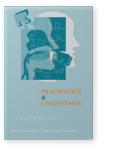Vol. 7:2 (1999) ► pp.375–403
BAD as a semantic primitive
Evidence from Biblical Hebrew
In an article entitled "Is BAD a semantic primitive?" (1996), John Myhill suggested that the concept 'bad' should be removed from the list of semantic primitives put forward by Anna Wierzbicka and Cliff Goddard. Myhill argued (1) that 'bad' is semantically decomposable, (2) that there is no word in Biblical Hebrew that corresponds to the English word bad and, thus, no linguistic form that represents the primitive BAD in this language, and (3) that 'bad' is dispensable in the semantic analysis and can be replaced with other components without any loss or change of meaning. Discussing and illustrating some fundamental questions in the search for universal semantic primitives, the present author reconsiders these findings and finds a different answer to John Myhill's question.
Cited by
Cited by 1 other publications
This list is based on CrossRef data as of 13 june 2024. Please note that it may not be complete. Sources presented here have been supplied by the respective publishers. Any errors therein should be reported to them.
